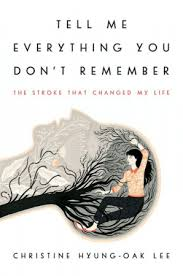
A Stroke as a Vehicle to Self-Discovery:
A Review of Christine Hyung-Oak Lee’s Tell Me Everything You Don’t Remember
Christine Hyung-Oak Lee was born in 1973 in Queens, New York. Her parents had emigrated from South Korea to the United States to pursue professional careers. While her mother and father envisioned Lee would grow up to contribute to the medical world, the independently-minded Lee graduated with an English degree to become a writer. Then, on December 31, 2006, at age 33, Lee woke up with an excruciating headache. She suddenly had difficulty forming sentences, steadying her balance, and seeing the world in its true form. She suffered a thalamic stroke. Just over 10 years later, she published the powerful and honest account of the events leading up to her stroke, and how her identity changed and continued to shift as she confronts the challenges of her new life.
Lee’s stroke resulted from a congenital heart defect, a Patent Foramen Ovale (PFO). Without knowing it and without suspecting any medical or physical deviance, she had lived with a hole in her heart for her entire life—until a blood clot charged through this hole and lodged in her brain, causing a debilitating sensory overload, cognitive uncertainty that she needed help and an aphasia that weakened her ability to ask for it. Eventually, Lee was taken to the emergency department, where she had learned of her diagnosis.
So began her first steps toward rehabilitation. Lee describes the difference between observable impairment and the deficits she felt within, noting the many instances in which she was told that she didn’t look or act like she was brain injured. Despite this discrepancy, Lee struggled with an expressive aphasia, which was isolating as social interactions had become exhausting and somewhat unattainable. As a writer, she was pained by the idea that she could not explain how she was different or what she was feeling. Words and memories did not beckon when she tried to recall them. This disloyalty fueled her commitment to chronicle her experiences in a journal to preserve everything that she felt was fleeing. She targeted writing in her healing process: “My mind told my brain to recognize that writing was an absolute necessary. The brain does not do what isn’t necessary.” As such, her journal had become therapeutic, as well as the foundation for her memoir.
Lee’s story is powerful and comprehensive. While the essence of her work is grounded by the devastating fact that she experienced a stroke at such a young age, it speaks volumes about what it means to persevere with rehabilitation. For Lee, rehabilitation is not about going back to who she was, but discovering who she wants to become. She integrates her childhood memories of feeling short of breath, figuratively and literally, as she satirically comments on her lack of athleticism which was epiphanically due to her heart defect. She goes on to explore the other sides of her identity dictated by the undiscovered hole in her heart. She also weaves in the sense of cultural divides between herself and her Korean family, and her Jewish husband’s heritage. In this way, Lee’s story demonstrates how her affliction did not and will not determine her identity. The stroke brought the complexities of her life into focus; thereby, becoming a painful opportunity for her to assess the discordant aspects of her life. The recovery from her stroke; therefore, becomes only one dimension of her relatable, cunning and inspiring journey toward redefining herself.
Jessica Diamond has her BA from Stony Brook University where she studied psychology and English. She earned her MS in Speech Language Pathology, graduating with distinction from Nazareth College of Rochester, New York. She presented at the ASHA Convention (2016) and YWRI Interprofessional and International Conference on language enrichment for adult refugees. Jessica currently resides in New York City where she is completing her clinical fellowship, working with the inner-city youth with language, cognitive and literacy disorders.
